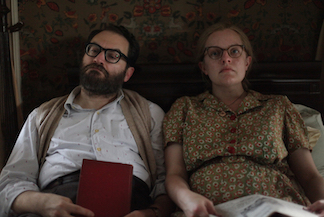|
|
Movie Review: ShirleyBy Matthew HuntleyJune 27, 2020
And yet, Shirley may also view Rose as someone she can finally control after what we assume has been years of her feeling dominated by Stanley. Her desire to manipulate and shape Rose gains an extra dimension when Shirley likens her to a local girl named Paula, who recently disappeared and whom Shirley has made the subject of her latest work-in-progress. As it turns out, Paula attended Bennington College and was one of Stanley’s students. In blurry, distorted visions, Shirley imagines Rose as Paula and attempts to give the missing girl a voice. Clearly, there is a lot to unpack in “Shirley” and it doesn’t always move at a pace that keeps us traditionally entertained (it can be slow and anesthetizing at times), but it’s always watchable and proves most fulfilling in hindsight. I admire that one of its agendas seems to be that it has no single agenda — it’s a mix of many genres and avoids being easily categorizable. What’s certain about it is that it deconstructs its female characters richly and thoroughly. Shirley and Rose are two fascinating individuals: women with whom we mostly sympathize but sometimes condemn for their lewd and immature behavior, even though we understand their need to rebel against the patriarchal society of the 1950s and ultimately emerge out of the shadows of their husbands. It should come as no surprise that Elisabeth Moss easily sinks her teeth into Shirley. Moss has made a career out of playing persecuted women in shows like “Mad Men” and “The Handmaid’s Tale” and films like “The Invisible Man.” With “Shirley,” she maintains her reputation for being a fearless actress who’s willing to expose herself and be made vulnerable, and in spite of some of Shirley’s likeness to her prior roles, Moss and Decker still manage to make this character unique and fresh. The same can be said of Young, whose role as Rose is even trickier because it’s Rose who goes through the greatest transformation from obedient housewife to formidable adversary to both Shirley and Fred. With her strong expressions and body language, Young gives us a palpable sense of Rose’s mental and physical turmoil as she struggles to find her place in a man’s world. As much as the screenplay develops Shirley and Rose, it also under-develops Stanley and Fred. Whereas the female characters are complicated and multi-dimensional, the men, by comparison, seem one-note and stereotypical. The screenplay paints them as egotistical, secretive and philandering, and we unfortunately leave the film not feeling like we really got to know them or that the story saw them as anything but hurdles to the women’s freedom and happiness. This is an overused device in stories about female empowerment, and while I understand it provides a catalyst for the women to explore who they are, I think it would have been more courageous of “Shirley” to give Stanley and Fred some standalone scenes, perhaps allowing the film to become a four-person character study instead of just two. As it is, I couldn’t help but think the male characters got shortchanged, which made them (and the film) less interesting. Still, such a flaw doesn’t dilute the lasting power of “Shirley,” and what’s also noteworthy about the film is just how visually and aurally striking it is. Despite the underlying tension and shifting of psyches of its characters, Sturla Brandth Grøvlen’s cinematography, Sue Chan’s production design and Kirby Feagan’s art direction are paradoxically warm and inviting, capturing the exterior and interiors of Shirley and Stanley’s multi-storied, ivy enwrapped house in such a way that our bodies are completely relaxed as our eyes soak in the plush images, from the tall vegetation on the outside to the creaky wooden floors, stacks of books, shapely lamps and multiple throw blankets on the inside. Combined with the sounds of crickets, birds and wind, “Shirley” is tantamount to taking a pleasant nature or museum walk, which is ironic given the dark, bitter nature of Shirley and Rose’s situations. I didn’t expect “Shirley” to be as technically appealing as much as narratively gripping, but Decker and her crew have gone beyond our expectations on both fronts, and despite the story deliberately taking liberty with the truth, where I think it is truthful is in its depiction of the creative process, in this case writing. Not everyone is creative, myself included, but I think we all fall for the idea there’s a formula for being inventive. “Shirley” reminds us such a formula doesn’t exist and what gets put on a page, a wall, a canvas, or carved out of a piece of wood, etc., is often contextual and a snapshot of a particular time in the creator’s life. Inspiration can come at any time but we can’t force it to appear. What’s more is the film argues against any formula that produces false and insincere results, specifically when it comes to women being made secondary to men. Shirley and Rose show us that whenever a system forces us to be false about who we are, it can be scary and unsettling, even drive us mad. Perhaps it was an aspect of this fear the real Jackson knew and tapped into so well with her writing. I can’t say for sure, but I’ll have a better idea once I read her work.
|

|
|
|

|
Thursday, October 31, 2024
© 2024 Box Office Prophets, a division of One Of Us, Inc.


